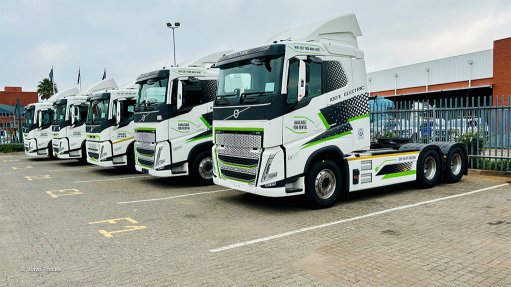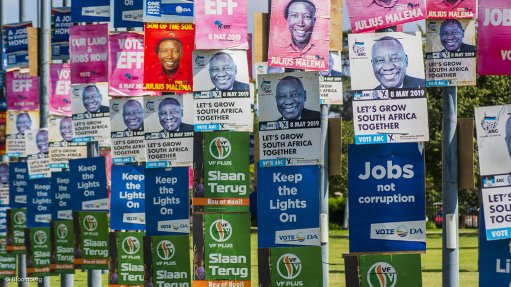‘Not one’ CSR locomotive made in South Africa, economic research group claims
Research commissioned by independent economic research institution Trade and Industrial Policy Strategies (TIPS) has found that, despite local-content obligations, not one of the China South Rail (CSR) locomotives being procured by Transnet has been assembled in South Africa and that all have been manufactured in China.
The research, conducted for TIPS by the Centre for Competition, Regulation and Economic Development, says the findings have been verified by scrutinising South Africa’s import bill for locomotives, which has grown significantly. “The imports were less than $50-million per year through 2013, but then climbed to $100-million in 2014 and $550-million in 2015,” TIPS reports in its latest ‘Real Economy Bulletin’.
It appears, the report states, that CSR has been given “exemptions” by Transnet on the number of locomotives that needed to be produced in South Africa, even though the procurement programme aimed explicitly to simulate local industry and industrial development.
In fact, when the R50-billion contract to procure 1 064 electric and diesel locomotives from four suppliers was announced in March 2014, the local-content stipulations were held up as offering major industrialisation spin-offs.
CSR Zhuzhou Electric Locomotive and Bombardier Transportation South Africa were contracted to collectively supply 599 electric locomotives, while General Electric South Africa Technologies and China North Rail (CNR) Rolling Stock South Africa would supply the 465 diesel locomotives. CSR and CNR subsequently merged, but the contracts continue to be treated separately by Transnet.
The CSR contract, valued at around R18-billion, was for 359 electric locomotives and was in addition to two earlier contracts placed by Transnet with CSR for 95 and 100 electric locomotives respectively.
Besides commercial, technical, black economic-empowerment, training and technology-transfer commitments, the successful original-equipment manufacturers (OEMs) also had to meet the Department of Trade and Industry’s 55% local-content stipulation for the diesel locomotives and a 60% threshold for the electric locomotives.
Then Transnet CEO Brian Molefe even announced that some suppliers would deliver localisation spin-offs of above 65%, which would both stimulate the domestic railways reindustrialisation process and support the transformation of Transnet Engineering into an African rail OEM.
However, rumours soon emerged than not all the OEMs were honouring their local-content commitments, a fact confirmed recently by Trade and Industry Minister Dr Rob Davies in a response to a Parliamentary question.
In an oral response in June, Davies raised concerns over the performance of the Chinese locomotive suppliers in meeting the specified localisation commitments for the contracts.
He said a number of local suppliers had benefited from technology-transfer and supplier-development programmes implemented by the OEMs, but indicated that the benefits had mainly arisen from the contracts with General Electric and Bombardier.
The TIPS research appears to confirm this, stating: “The remaining suppliers to Transnet under this procurement process have lived up to their obligations; they have invested, developed suppliers and are exporting components to the region and globally. Transnet Engineering has also built its own capabilities to produce locomotives, which is a positive signal.”
By contrast, its research shows that CSR “undertook virtually no localisation of production”.
TIPS also argued that, in light of the fact that the State had few tools available to stimulate industrialisation, the localisation of procurement was one of the most important levers. “As a minimum, the remaining locomotives that Transnet will get in 2018 must be locally manufactured and the cost of each locomotive must be reviewed to ensure they do not incorporate corrupt payments.”
The issue of potential corrupt payments has been brought to the fore by the so-called #GuptaLeaks emails, which resulted in a report by amaBhungane and Scorpio alleging that a company owned by Salim Essa, who is said to have strong ties to the Guptas, is receiving R10-million from each R50-million locomotive that Transnet is buying from CSR.
“With the slowing economy, the effects of high-level corruption can now be explicitly felt. Where government policies designed to stimulate industrialisation have been captured, the result is not only corruption and money laundering, but also weaker foreign direct investment and slower industrialisation,” TIPS said in its bulletin.
“The State has few tools available to stimulate industrialisation, and the localisation of its procurement is one of its most important levers. “Moral outrage aside, when corruption results in the importation of these items, it is a double blow to the economy – South Africa pays more for public investment and also loses the hoped-for stimulus to industry with the jobs and domestic manufacturing opportunities that would have been created.”
Separately, the Economic Freedom Fighters (EFF) has laid criminal charges against those it claims to have been involved in illegally inflating the cost of the CSR contract, including Finance Minister Malusi Gigaba, and has indicated that it also plans to interdict the contract and have it overturned. The EFF alleges that the contract value for the ‘1 064 locomotive’ contract was inflated by R17.4-billion.
In response to a question posed by Engineering News, Transnet described as inaccurate the claim that none of the locomotives procured from CSR have been manufactured locally. “In line with the contract on the 1 064 locomotive acquisition programme, CSR manufactured the first 40 of the 359 locomotives in China. The remaining 319 are currently being assembled at our engineering and manufacturing facility in Koedoespoort, Pretoria. So far, CSR has delivered a total of 103 locomotives; 98 of these have been tested and accepted into operation. Of that 98, 58 were assembled and manufactured locally.” Local content in the electric and diesel locomotives is governed by the National Treasury’s Rail Rolling Stock Instruction note and Transnet says it has implemented a series of governance, control and monitoring measures to ensure that OEMs comply with their supplier development commitments. It adds that the Department of Trade and Industry is responsible for local-content verification, which is conducted through the South African Bureau of Standards. “Regarding the 95 Class 20E and 100 Class 21E electric locomotives contracts, work on both contracts has been completed and all locomotives have been delivered and accepted into operation. “In terms of production, only 10 of the 95 Class 20E locomotives were produced in China. The remaining 85 were manufactured in South Africa. For the 100 Class 21E contract, 40 of the 100 locomotives were produced in China and the remaining 60 locomotives were assembled at Koedoespoort, Pretoria. Both contracts did not have local-content requirements as this was not applicable at the time of procurement.”Comments
Press Office
Announcements
What's On
Subscribe to improve your user experience...
Option 1 (equivalent of R125 a month):
Receive a weekly copy of Creamer Media's Engineering News & Mining Weekly magazine
(print copy for those in South Africa and e-magazine for those outside of South Africa)
Receive daily email newsletters
Access to full search results
Access archive of magazine back copies
Access to Projects in Progress
Access to ONE Research Report of your choice in PDF format
Option 2 (equivalent of R375 a month):
All benefits from Option 1
PLUS
Access to Creamer Media's Research Channel Africa for ALL Research Reports, in PDF format, on various industrial and mining sectors
including Electricity; Water; Energy Transition; Hydrogen; Roads, Rail and Ports; Coal; Gold; Platinum; Battery Metals; etc.
Already a subscriber?
Forgotten your password?
Receive weekly copy of Creamer Media's Engineering News & Mining Weekly magazine (print copy for those in South Africa and e-magazine for those outside of South Africa)
➕
Recieve daily email newsletters
➕
Access to full search results
➕
Access archive of magazine back copies
➕
Access to Projects in Progress
➕
Access to ONE Research Report of your choice in PDF format
RESEARCH CHANNEL AFRICA
R4500 (equivalent of R375 a month)
SUBSCRIBEAll benefits from Option 1
➕
Access to Creamer Media's Research Channel Africa for ALL Research Reports on various industrial and mining sectors, in PDF format, including on:
Electricity
➕
Water
➕
Energy Transition
➕
Hydrogen
➕
Roads, Rail and Ports
➕
Coal
➕
Gold
➕
Platinum
➕
Battery Metals
➕
etc.
Receive all benefits from Option 1 or Option 2 delivered to numerous people at your company
➕
Multiple User names and Passwords for simultaneous log-ins
➕
Intranet integration access to all in your organisation


















